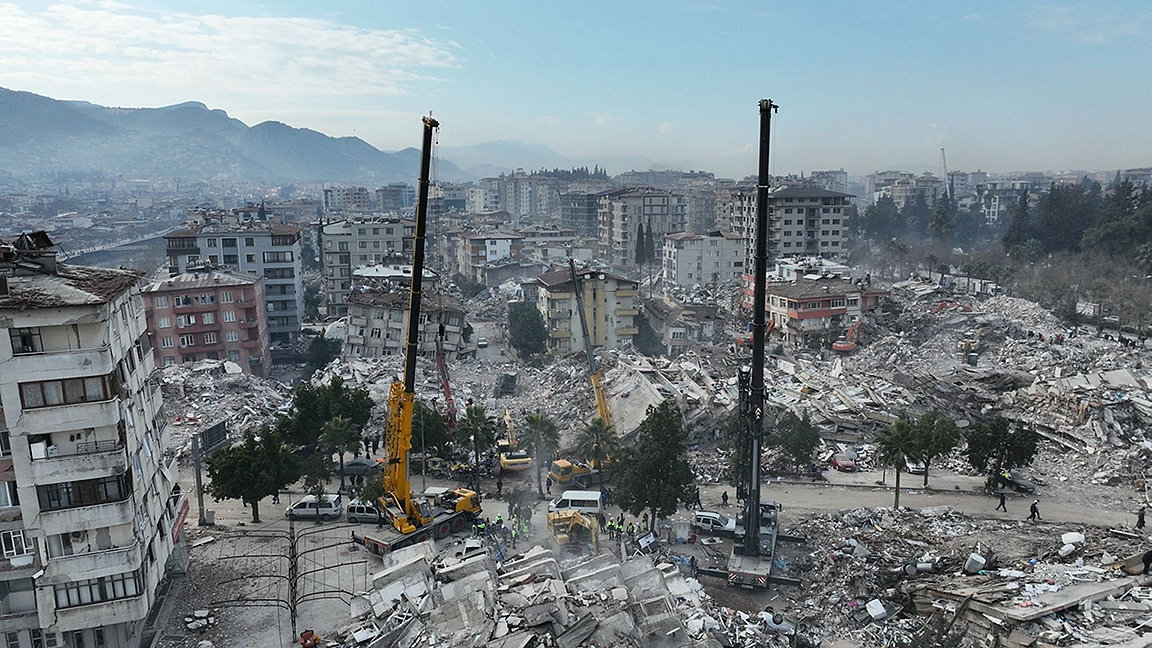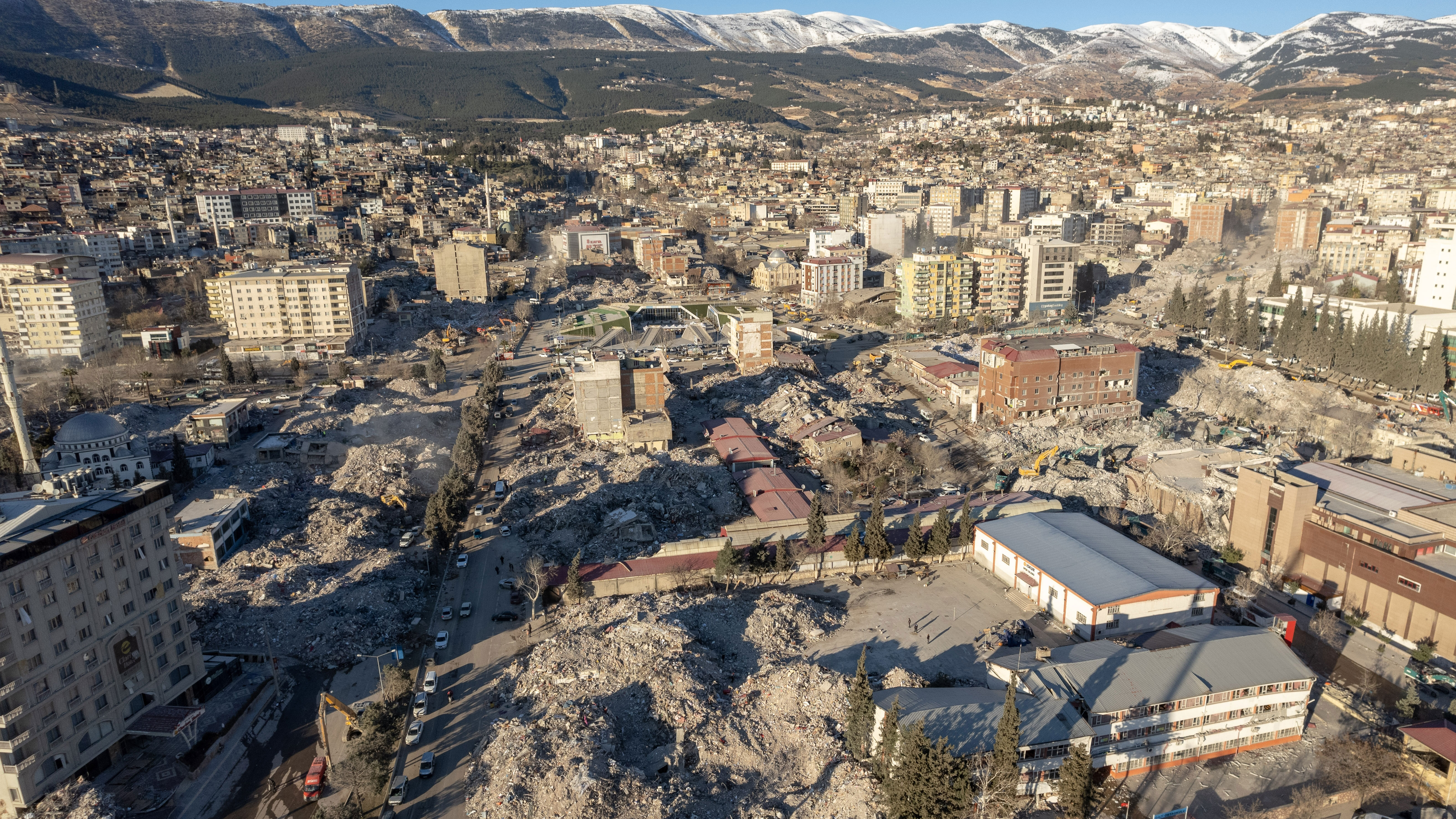
Kahramanmaras, Türkiye Photographer: Midary/Shutterstock
Poor building quality and code compliance aggravated the damage caused by recent earthquakes in Republic of Türkiye and Syria. But could it have been a different story?
The past decade has seen a number of natural disasters, and the enormous social, economic and financial losses associated with these – not to mention the loss of life – were partly exacerbated by unplanned and uncontrolled urbanisation and infrastructure.
Disaster losses prompt global response
In response to these disasters, 187 of the 193 UN states came together under the UN Sendai Framework for Disaster Risk Reduction 2015–2030 to tackle the increasing number of losses.
Over the past two decades, natural hazards and their after-effects have accounted for the loss of 1.3m human lives and reported economic losses of US$2.9bn.
Moreover, according to data published in the UN Office for Disaster Reduction 2020 annual report, disaster risks in developing countries could lead to economic losses of up to 19% of annual GDP. This could eradicate years of growth, imposing severe strain on economies and plunging people into poverty.
Disasters result from natural or biological hazards and human vulnerabilities. Floods, tsunamis, wildfires, earthquakes and other extreme climatic conditions account for natural hazards, while biological hazards include pandemics such as COVID-19. Added to this, global climate change has increased the frequency, intensity, extent and duration of extreme weather events, exacerbating natural and biological hazards alike.
Framework sets out four priorities
Under the Sendai framework, there are four main priorities to reduce the frequency and impact of hazards, as follows.
- Understanding disaster risk: this is the key to managing and minimising negative impacts. In countries where natural hazards are common, communities, industries and various government bodies have often failed to acknowledge the risks, and even where they do their impact is underestimated. Built environment professionals need to be fully aware of their role in responding to such problems. They need to innovate, being creative and compassionate to ensure disaster-resilient construction and recovery measures. New skills are required to understand the societal aspects of built environment practices. Professional institutions that educate and accredit built environment practitioners' qualifications should also ensure they instruct them in disaster risk reduction (DRR).
- Strengthening governance to manage risk: governance refers to the people, organisations and processes involved in key decisions. Such governance is a wide-ranging system that engages different levels of government, state institutions, national standard-setters, private businesses, professional bodies, civil society organisations, academics and researchers and the media. Inclusive governance of systemic risk is essential in improving disaster risk management. Moreover, it must be based on scientific evidence.
- Investing in DRR for resilience: despite the UN giving detailed explanations of the need to improve DRR across the board, there is still a clear lag in investment. An optimal balance between disaster response and risk reduction has not yet been found. Factors that need to be considered in construction include enhancing redundancy in structural design to accelerate recovery when buildings fail. This requires investment in additional human capital, equipment and organisational assets.
- Embedding the build back better principle: it is also essential that resilience be systematically integrated into the whole design, construction and building operation process and not simply be an afterthought. At all points in a disaster management cycle – namely mitigation, preparedness, response and recovery – appropriate action must be taken. Mitigation involves minimising the potential effects of disaster though measures such as building codes, vulnerability analyses and public education, while preparedness can entail planning, emergency exercises and warning systems. Response and recovery occur when disasters have struck, and they concern, respectively, provision of search and rescue and emergency relief, and helping the community with, for instance, temporary housing and medical care. Together, these will all lead to reduced vulnerability and prevention of disasters.
Barriers remain to integrating DRR
There are still a number of challenges for integrating DRR into construction, however.
- Lack of regulatory framework: capacity and coordination are lacking at the national level in some countries, while building codes are incompatible with one another, and rules and regulations need to be enforced at all levels.
- Unplanned cities and urbanisation: in some countries, a lack of focus on cities and urbanisation can cause significant global ecological, economic and social problems and risks. Innovative urbanisation strategies that can respond to this include limiting the development of certain types of building use, and creating safe zones by making sure that there are no high-rise buildings or that population density does not increase the chance of an excessive death toll in an emergency. These can all help to reduce energy usage, strengthen infrastructure, limit urban sprawl, and minimise adverse environmental impacts.
- Lack of understanding of systemic risks: COVID-19 posed a significant challenge because governments, local authorities, health boards and communities lacked understanding and experience in handling a pandemic. This meant that when natural hazards occurred, such as the tropical cyclone that struck the Solomon Islands, Vanuatu, Fiji and Tonga, responses were limited. The lack of understanding of systemic risk can therefore become a significant challenge as the various statutory bodies struggle to cope with unknowns, as well as resources being overwhelmed by the scale of demand.
- Institutional arrangements: shortcomings in identifying the roles and responsibilities of the stakeholders such as central governments, local governments, communities and the general population can include a lack of effective communication, no proper mechanisms for sharing good practice and resources between cities, countries and organisations, an absence of proper leadership and teamworking facilities, and a lack of user-friendly and straightforward processes.
- Lack of resources: the scarcity of resources such as experienced and qualified medical staff, rescue organisations and professional people who can contribute to redevelopment is one of the main effects of underinvestment in DRR. In developing economies, this is exacerbated by the limited infrastructure capacity.
- Inadequate understanding among clients and property owners: poor or imprecise understanding of what each profession does, and how they relate to one another as well as their overlapping roles and expertise, mean that expertise cannot be used effectively. For example, police, rescue organisations and the military all have a responsibility for order and helping the population, but need to be coordinated effectively to do so. Some skills are specific to particular professions, while others such as project management are shared, but there is a lack of understanding by all parties as well as little information on employing built environment practitioners in DRR.
'There are still a number of challenges for integrating disaster risk reduction into construction'
In October, the University of Huddersfield – assisted by RICS – drew attention to the issues with DRR in a guide for the built environment.
However, governments still need to take action. Through the Sendai framework, the UN has secured agreement from 187 member states to take action. Yet the recent earthquakes in Republic of Türkiye and Syria show the scale of the task ahead.
Working with its partners at the University of Huddersfield, RICS is willing to take a lead on this for those parties around the globe that want to ensure the countries and communities at risk are adequately protected.
Martin Conlon FRICS is a former director at Assent Building Control and former chair of the RICS Building Control Professional Group Board
Contact Martin: Email
Related competencies include: Design and specification, Legal/regulatory compliance, Risk management

